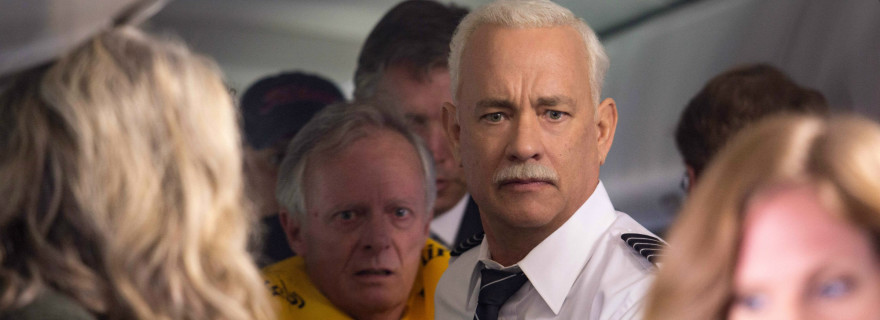'Sully'
Movie Rating:
2.5
Like almost all of the later period films directed by Clint Eastwood, ‘Sully’ seems to be executed with a mixture of passion and disinterest. The movie has some rousing, even stunning sequences executed by the aging filmmaker (especially anything involving the airplane tragedy), but it also has tedious dialogue scenes that Eastwood barely seems to care about staging. It’s a decent movie, but likely would have been improved by a director more concerned with emotional impact that production efficiency.
The film is of course about Chesley Sullenberger, the US Airways pilot who managed to crash-land a commercial jet in the middle of the Hudson River without a single casualty. It opens with Tom Hanks’ version of Sully making all the wrong decisions and seeing his plane explode in a fireball against a New York skyscraper. That is of course just a dream, after which Sully wakes up, calls his wife and goes about his day. The big heroic landing is doled out slowly in flashback by Eastwood, with the main plot set afterwards as Sully makes exhausting media rounds and has to argue with the airline oversight committee to prove that he made the right choice in dropping his plane into the drink. In theory, there should be some suspense about whether or not Sully made the right call. However, given that we all know what happened and that there’s now a movie that exists about the guy, it’s pretty easy to guess how it turns out.
It’s kind of amusing to think that the elderly Eastwood decided to take that specific angle on the Sullenberger story, considering that it’s essentially the tale of a righteous old man telling a younger generation that they don’t know what they’re talking about. That’s some fun subtext for those in love with the Eastwood legend, even if it hurts the dramatic thrust of the piece. Ultimately, the movie exists entirely for the crash and rescue sequences designed to fill up IMAX screens. Admittedly, that stuff is all well done. It’s simply shot with none of the visual pyrotechnics that Robert Zemeckis brought to the astounding plane crash in ‘Flight’, but the scenes have a certain power impossible to deny. It’s gripping stuff and all the footage of New York rescue workers ensuring that everyone made it out alive are quite inspiring. Unfortunately, this is yet another of those IMAX Hollywood features that would be better served by offering viewers the opportunity to only watch the IMAX material and skip the rest.
Granted, Tom Hanks is ideally cast as Sully. This is another of his “noble captain in danger” pictures like ‘Apollo 13’ and ‘Captain Phillips’, and he knows exactly how to play an everyman forced into heroism. He handles that material well. Unfortunately, over half the movie is spent with him wandering around talking about how irritating it is to do interviews and complaining that the oversight committee will just never understand what it’s like to fly a plane under desperate circumstances. Hanks gets Aaron Eckhart as his co-pilot to share all those great debate scenes with and they have an endearing screen chemistry. The scenes are just tediously repetitive. Knowing the inevitable conclusion that the story is slowly marching toward, there’s never much tension. It plays out exactly how you’d imagine.
There will likely be audiences who appreciate the safe and comfy predictability of the film’s dramatic conceit. It’s the type of thing that rewards those happy to never be too stressed out by surprise on the big screen. Everyone else will merely count the seconds between the airplane sequences, which offers a certain uncomfortable sense of bloodlust. These are problems inherent in the source material, but they’re also the result of Clint Eastwood’s increasingly tiresome filmmaking formula. He’s not particularly interested in risk, just in delivering proven old-timey narratives and executing them in a manner that can best be described as “workmanlike.” His movies are getting lazier and more difficult to get excited about since he doesn’t seem particularly excited about even making them anymore. By the time the movie fades to black in an awkward ending that feels more like giving up than reaching a conclusion, it’s hard not to feel mildly ripped-off. If Eastwood is barely interested in making these movies, then why should viewers be interested in watching them?




Shannon Nutt
Eastwood movies are an acquired taste. He’s low key and he rarely films more than a couple takes of each scene. If I recall, you weren’t a fan of “American Sniper” either, and I thought that film was great. Eastwood is very much an old-fashioned filmmaker…he doesn’t particularly care about pacing or flashy cuts – he just wants to tell his story.
Not having seen this one yet, I can’t make a judgment beyond that, but I’m guessing this is something I’m going to enjoy quite a bit – Eastwood is in my top 5 living directors.
Chris B
Phil, I read recently that this is the first movie to be shot entirely with IMAX cameras. Was there a noticeable difference in the look of the film as a result?
Josh Zyber
The movie was shot *almost* entirely with Arri’s new digital IMAX camera, which is much smaller and quieter than traditional film IMAX. That makes it possible to shoot intimate dialogue scenes without the actors being drowned out by the sound of the camera. Some scenes were shot with normal Arri digital cameras.